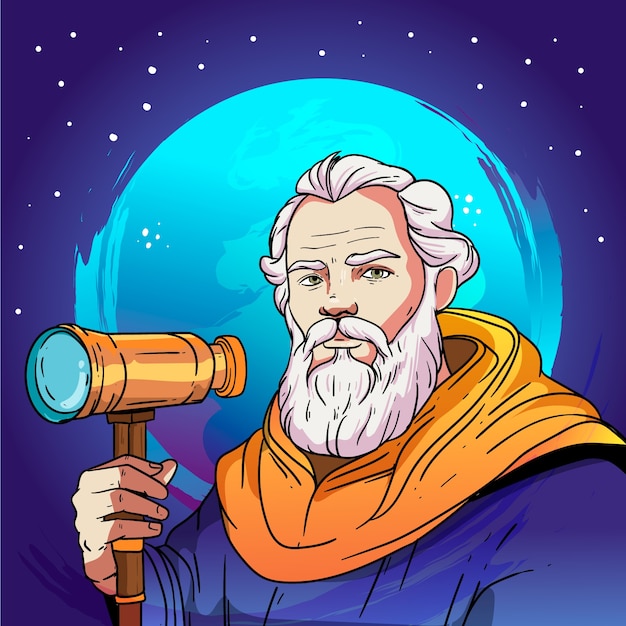Nicolaus Copernicus – Fascinating Facts about the Revolutionary Astronomer

Nicolaus Copernicus was a Polish astronomer who revolutionized our understanding of the universe.
Copernicus is best known for his proposal that the sun, not the Earth, is the center of the solar system.
The Copernican Revolution marked a major shift in scientific thinking and laid the foundation for modern astronomy.
Copernicus was born in Torun, Poland in 1473.
He studied at the University of Krakow and later earned a doctorate in canon law from the University of Ferrara in Italy.
Copernicus served as a canon and physician for several churches and monasteries throughout his life.
He spent years studying ancient and medieval astronomy, leading him to question the prevailing geocentric model of the universe.
Copernicus published his groundbreaking work De Revolutionibus Orbium Coelestium (On the Revolutions of the Celestial Spheres) in 15
9. He argued that the Earth was not the center of the universe and that the planets, including Earth, revolve around the sun.
Copernicus’s book was initially met with resistance from the Catholic Church, as it challenged the widely accepted teachings of Aristotle and Ptolemy.
Despite this, his work gradually gained acceptance as more evidence supporting heliocentrism emerged.
Copernicus’s observations and calculations significantly improved the accuracy of astronomical predictions.
He also made important contributions to the field of mathematics, developing new methods for calculating planetary positions.
Nicolaus Copernicus – Fascinating Facts about the Revolutionary Astronomer part 2
Copernicus’s work laid the groundwork for future astronomers, such as Johannes Kepler and Galileo Galilei, to further challenge and refine our understanding of the universe.
His theories had a profound impact on scientific and philosophical thought, challenging long-held beliefs about our place in the cosmos.
Copernicus’s heliocentric model of the solar system eventually became widely accepted, leading to a shift in our understanding of the universe.
In addition to his astronomical work, Copernicus also served as a physician and economist, showing his diverse range of interests and talents.
Copernicus’s work continues to inspire and influence scientists and thinkers to this day.
His contributions to the field of astronomy earned him the title Father of Modern Astronomy.
Copernicus’s theories sparked a scientific revolution that paved the way for future advancements in astronomy and physics.
His work challenged the prevailing belief in Earth’s centrality and paved the way for a more accurate understanding of the universe.
Copernicus’s theories were a result of his observations and mathematical calculations, marking a shift from speculative thought to empirical evidence.
He made use of new instruments, such as the quadrant and armillary sphere, to gather data and support his theories.
Copernicus’s work helped establish the scientific method and the importance of empirical evidence in scientific inquiry.
Despite facing criticism and opposition, Copernicus remained steadfast in his beliefs and continued to pursue his scientific investigations.
He believed that a heliocentric model of the universe provided a more elegant and accurate explanation for the movements of celestial bodies.
Copernicus’s work challenged not only scientific beliefs but also religious and cultural beliefs of the time.
His theories sparked debates and discussions that led to a more critical and questioning approach to understanding the natural world.
Copernicus’s ideas had far-reaching implications for various fields, including theology, philosophy, and cosmology.
His work inspired future generations of astronomers and scientists to question established beliefs and seek new knowledge.
Copernicus’s insights and discoveries marked a major turning point in the history of science.
His heliocentric model of the solar system resolved many inconsistencies and inaccuracies in the geocentric model, improving the accuracy of astronomical predictions.
Copernicus’s work was a blend of ancient knowledge and new observations, showing his dedication to building upon the work of his predecessors.
His book De Revolutionibus was initially published in Latin, making it accessible to scholars across Europe.
Copernicus’s theories were met with both enthusiasm and resistance, exemplifying the struggle between new ideas and established beliefs.
His work challenged the notion of Earth’s special status in the universe, emphasizing the insignificance of our planet in the vastness of space.
Copernicus’s theories opened up new possibilities for exploration and understanding of the universe beyond our own solar system.
Despite the controversy surrounding his work, Copernicus remained committed to pursuing truth through scientific inquiry.
Copernicus’s ideas were a product of not only scientific curiosity but also a desire to make sense of the natural world and our place in it.
His heliocentric model of the solar system provided a more elegant explanation for the observed motions of celestial bodies.
Copernicus’s work demonstrated the importance of observation, measurement, and experimentation in scientific discovery.
He laid the foundation for modern astronomy by challenging long-held assumptions and paving the way for new discoveries.
Copernicus’s ideas were influenced by the works of ancient Greek philosophers, such as Pythagoras and Aristarchus.
His theories were further developed and refined by subsequent generations of astronomers, leading to increasingly accurate models of the universe.
Copernicus’s legacy continues to shape our understanding of the universe and the importance of progressive and critical thinking in scientific inquiry.

